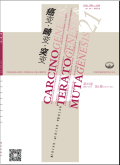癌变·畸变·突变2024,Vol.36Issue(3):187-194,8.DOI:10.3969/j.issn.1004-616x.2024.03.004
主要促进因子超家族成员2a在肝细胞癌组织中的表达及其临床意义
The expression and clinical significance of MFSD2A in hepatocellular carcinoma
摘要
Abstract
OBJECTIVE:To investigate expression of the major facilitator superfamily domain-containing protein 2a(MFSD2A)in hepatocellular carcinoma(HCC)tissues,and its correlation with clinical characteristics and prognosis of HCC patients.METHODS:The transcriptome data from 424 cases of HCC and 50 adjacent non-cancerous tissues,along with relevant clinical information were downloaded from The Cancer Genome Atlas(TCGA)database.Using a bioinformatics platform,expression of MFSD2A across various cancer types were compared.Association between MFSD2A expression and prognosis in HCC patients were evaluated using the Kaplan-Meier Plotter database.Additionally,a protein-protein interaction network of MFSD2A was constructed using the STRING database,related genes were retrieved using the GEPIA2 database,and pathway enrichment was analyzed to explore the molecular function of MFSD2A.Immunohistochemistry was performed to validate the expression of MFSD2A protein in HCC tumor tissues.RESULTS:Analysis of the TCGA data revealed significant differences in MFSD2A gene expression levels across various tissues.Specifically,MFSD2A was significantly under expressed in HCC tissues compared to adjacent tissues(P<0.01).Moreover,the expression increased in the over 60 age group(P=0.014),in the G1 pathological grade group(P<0.01),and in the group with AFP blood levels≤400 ng/mL(P<0.01).High expression of MFSD2A was associated with significantly prolonged overall survival(P=0.008),progression-free survival(P=0.008),and recurrence-free survival(P=0.016)in patients.MFSD2A and its interacting proteins primarily participated in lipid metabolism-related PPAR signaling pathways.Immunohistochemistry analyses indicated that patients with high MFSD2A expression had better prognosis(P=0.016)compared to those with low expression,and serum AFP levels decreased with increasing MFSD2A scores.CONCLUSION:Low expression of MFSD2A was observed in HCC tissues and was associated with poor prognosis in patients.The results indicate that MFSD2A inhibited the progression of HCC by regulating hepatic lipid metabolism,and suggest that it may be a therapeutic target for hepatocellular carcinoma.关键词
主要促进因子超家族成员2a/肝细胞癌/预后/甲胎蛋白/脂质代谢Key words
MFSD2A/hepatocellular carcinoma/prognosis/AFP/lipid metabolism分类
医药卫生引用本文复制引用
马晟,王希君,刘振荣,王雅茹,胡楠,荣维淇,肖汀..主要促进因子超家族成员2a在肝细胞癌组织中的表达及其临床意义[J].癌变·畸变·突变,2024,36(3):187-194,8.基金项目
中国医学科学院医学与健康科技创新工程(2021-1-12M-050) (2021-1-12M-050)

